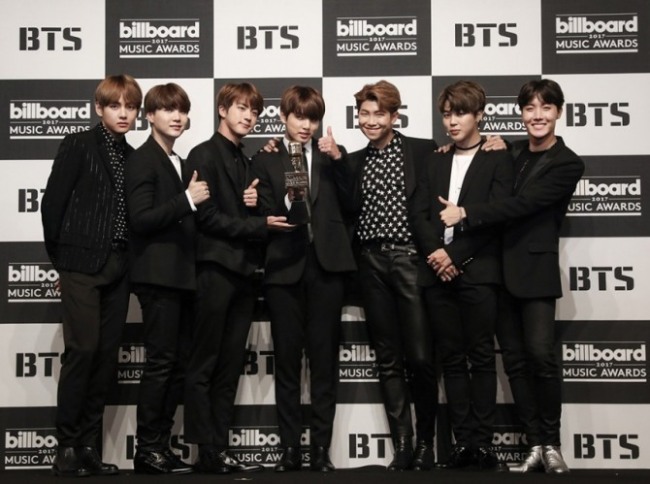No products in the cart.

The South Korean mastermind behind K-pop band BTS, which was tweeted about more than any celebrity in the world this year, is considering an initial public offering as the $5 billion industry that unleashed Psy’s “Gangnam Style” climbs the charts in the US and China.
Big Hit Entertainment has talked with its shareholders -- which included Legend Holdings Corp.’s venture-capital arm and LB Investment -- about an IPO, Bang Si-hyuk, the company’s chief executive officer and founder, said during an interview at his office in Seoul.
There are no current plans, and details such as the timing and scale of the offering have yet to be worked out, he said.
“We’d like to do a meaningful public offering,“ Bang, 45, said in his first public acknowledgment about a potential sale. Still, the company needs to become bigger and establish a sustainable production system before proceeding with an IPO, he said.
Such an offering would be the biggest in the blooming K-pop industry in two decades and help Big Hit further capitalize on the success of the seven-member boy band after performances at last month’s American Music Awards and on Ellen DeGeneres’s talk show.
Big Hit Entertainment has talked with its shareholders -- which included Legend Holdings Corp.’s venture-capital arm and LB Investment -- about an IPO, Bang Si-hyuk, the company’s chief executive officer and founder, said during an interview at his office in Seoul.
There are no current plans, and details such as the timing and scale of the offering have yet to be worked out, he said.
“We’d like to do a meaningful public offering,“ Bang, 45, said in his first public acknowledgment about a potential sale. Still, the company needs to become bigger and establish a sustainable production system before proceeding with an IPO, he said.
Such an offering would be the biggest in the blooming K-pop industry in two decades and help Big Hit further capitalize on the success of the seven-member boy band after performances at last month’s American Music Awards and on Ellen DeGeneres’s talk show.
 |
|
(Big Hit Entertainment)
|
BTS is so popular that people have retweeted about or liked them on Twitter an estimated half-a-billion times this year -- more than US President Donald Trump and Justin Bieber combined. Revenue at Big Hit, which only manages a handful of lesser-known clients besides BTS, will probably double this year after doubling annually since BTS debuted in 2013, according to the company.
“Big Hit Entertainment’s market cap may exceed its peers’ value,” said Yang Seungwoo at Samsung Securities Co., who covers entertainment companies in Korea. “They could get a high valuation amid a boom in the Kosdaq and if they can diversify their revenue sources with various artists, digital streaming profits and concert tours overseas.”
Though he’s currently focused on BTS, Bang said he’s preparing to introduce a new boy band using a “success formula” that could be replicated with other K-pop bands seeking to break into the US charts. He’s weighing whether to team up with a music giant or go it alone and directly strike deals with US music labels, radio promoters and public-relations firms, Bang said.
Bang, known in the industry as “Hitman,” wouldn’t specify his strategy, but social media likely has something to do with it. BTS’s “MIC Drop” music video has garnered more than 68 million views on YouTube since its release in November -- more than for Selena Gomez’s “Wolves.”
“Big Hit Entertainment’s market cap may exceed its peers’ value,” said Yang Seungwoo at Samsung Securities Co., who covers entertainment companies in Korea. “They could get a high valuation amid a boom in the Kosdaq and if they can diversify their revenue sources with various artists, digital streaming profits and concert tours overseas.”
Though he’s currently focused on BTS, Bang said he’s preparing to introduce a new boy band using a “success formula” that could be replicated with other K-pop bands seeking to break into the US charts. He’s weighing whether to team up with a music giant or go it alone and directly strike deals with US music labels, radio promoters and public-relations firms, Bang said.
Bang, known in the industry as “Hitman,” wouldn’t specify his strategy, but social media likely has something to do with it. BTS’s “MIC Drop” music video has garnered more than 68 million views on YouTube since its release in November -- more than for Selena Gomez’s “Wolves.”
 |
|
(Yonhap)
|
Yet it’s not just Twitter. BTS is ubiquitous on social media in its home market of Korea, where it has the highest following on Naver’s live broadcasting app V Live and has a messaging-sticker business with Line. The band has about 1.4 million followers on Tencent Holdings’ QQ Music service.
“Social media was a big part of why BTS managed to break into the mainstream US market,” said Anna-Michelle Lavandier, an analyst at Shareablee. Getting a high number of likes and retweets -- also known as “actions” -- is a key measure of how fast one’s influence is spreading, she said.
Streaming services Spotify, Apple Music and AccuRadio have dedicated K-pop channels, as does the biggest service in China -- QQ Music, which has 100 million daily active users.
For Bang, who spoke earlier this month, BTS is the latest trophy of his long career in Korea’s music scene. In the 1990s, he helped found JYP Entertainment with K-pop giant Park Jin-young, where he composed songs for more than a dozen artists such as Rain but never called the shots.
Because of a self-professed distaste for being bossed around, Bang branched out on his own to set up Big Hit in 2005. Big Hit’s early days were tough, and it almost went bankrupt in 2007 after the company, which only had four employees, signed up just a handful of artists, Bang said.
Business was so slow that the company’s artists only came by to play daily tennis matches on the office’s Nintendo Wii, he said.
The company’s first breakthrough came in 2009, when its 8Eight’s “Without a Heart” became a local hit. Then Bang created BTS and produced some of their songs. Today, BTS is Korea’s “it” band. The group was No. 10 for the year on the Billboard US charts, and it’s planning major overseas concert tours next year.
Bang’s plans for BTS to include generating as much revenue as top American stars now. While such goals may not be realistic in the near future, what’s clear is that the band is winning over non-Korean fans.
“I wasn’t a K-pop fan, but then I saw how passionate BTS was about their music and their fans and everything they do,” said Josie Gates, a 19-year-old from Pennsylvania now studying in Seoul who went to a BTS concert this month. “I became a really die-hard fan.”(Bloomberg)
“Social media was a big part of why BTS managed to break into the mainstream US market,” said Anna-Michelle Lavandier, an analyst at Shareablee. Getting a high number of likes and retweets -- also known as “actions” -- is a key measure of how fast one’s influence is spreading, she said.
Streaming services Spotify, Apple Music and AccuRadio have dedicated K-pop channels, as does the biggest service in China -- QQ Music, which has 100 million daily active users.
For Bang, who spoke earlier this month, BTS is the latest trophy of his long career in Korea’s music scene. In the 1990s, he helped found JYP Entertainment with K-pop giant Park Jin-young, where he composed songs for more than a dozen artists such as Rain but never called the shots.
Because of a self-professed distaste for being bossed around, Bang branched out on his own to set up Big Hit in 2005. Big Hit’s early days were tough, and it almost went bankrupt in 2007 after the company, which only had four employees, signed up just a handful of artists, Bang said.
Business was so slow that the company’s artists only came by to play daily tennis matches on the office’s Nintendo Wii, he said.
The company’s first breakthrough came in 2009, when its 8Eight’s “Without a Heart” became a local hit. Then Bang created BTS and produced some of their songs. Today, BTS is Korea’s “it” band. The group was No. 10 for the year on the Billboard US charts, and it’s planning major overseas concert tours next year.
Bang’s plans for BTS to include generating as much revenue as top American stars now. While such goals may not be realistic in the near future, what’s clear is that the band is winning over non-Korean fans.
“I wasn’t a K-pop fan, but then I saw how passionate BTS was about their music and their fans and everything they do,” said Josie Gates, a 19-year-old from Pennsylvania now studying in Seoul who went to a BTS concert this month. “I became a really die-hard fan.”(Bloomberg)
Leave a comment














